Ethical Issues in Counseling: Analysis of Four Scenarios and Dilemmas
VerifiedAdded on 2022/09/29
|8
|2122
|23
Case Study
AI Summary
This assignment presents an analysis of ethical issues within the field of counseling through four distinct scenarios. The first scenario examines a counselor's ethical responsibilities regarding client communication and professional boundaries when taking time off, highlighting the importance of informing all clients to avoid disruptions and uphold ethical obligations. The second scenario delves into discriminatory behavior by an intern, focusing on the violation of ethical codes when treating clients differently based on gender, emphasizing the need for non-discriminatory practices. The third scenario explores a counselor's potential conflict of interest by becoming a representative for health products, questioning the ethical implications of selling products without proper authorization and training. The fourth scenario addresses a therapist's withholding of information from a client regarding their assessment results, examining the client's right to know and the therapist's ethical duty to provide information for the client's progress. Each scenario underscores the importance of adhering to ethical guidelines, maintaining professional conduct, and prioritizing client well-being in the counseling profession.
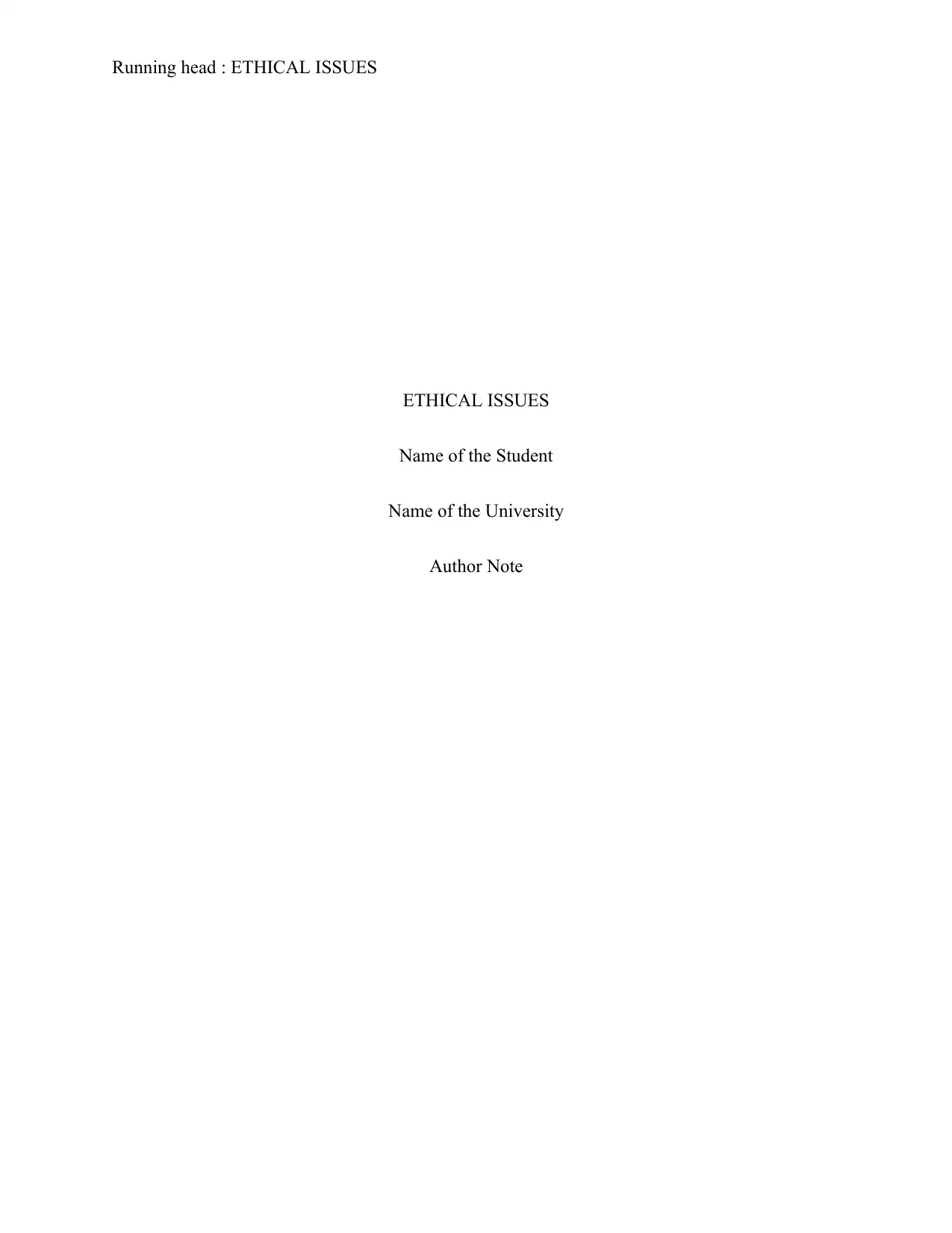
Running head : ETHICAL ISSUES
ETHICAL ISSUES
Name of the Student
Name of the University
Author Note
ETHICAL ISSUES
Name of the Student
Name of the University
Author Note
Paraphrase This Document
Need a fresh take? Get an instant paraphrase of this document with our AI Paraphraser
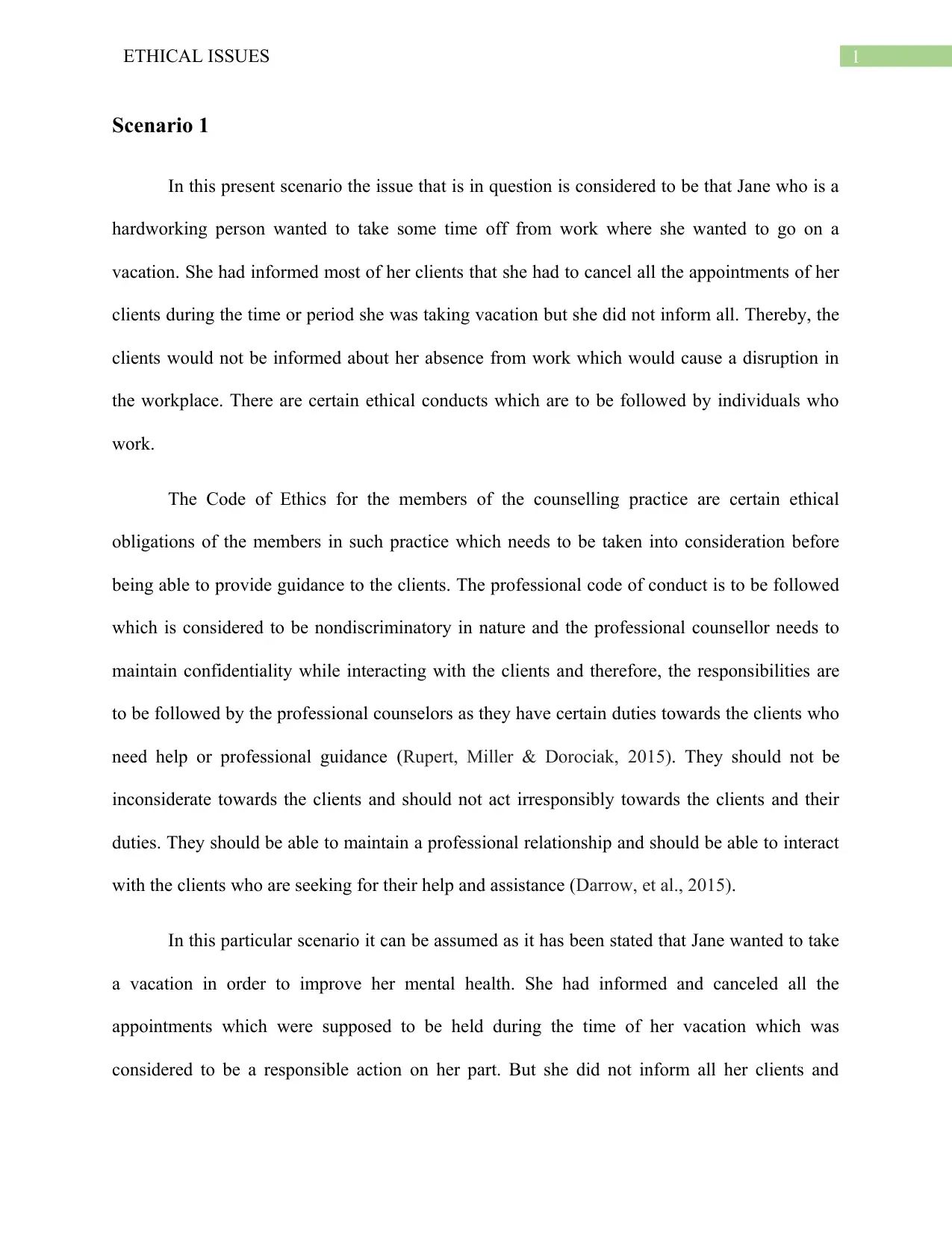
1ETHICAL ISSUES
Scenario 1
In this present scenario the issue that is in question is considered to be that Jane who is a
hardworking person wanted to take some time off from work where she wanted to go on a
vacation. She had informed most of her clients that she had to cancel all the appointments of her
clients during the time or period she was taking vacation but she did not inform all. Thereby, the
clients would not be informed about her absence from work which would cause a disruption in
the workplace. There are certain ethical conducts which are to be followed by individuals who
work.
The Code of Ethics for the members of the counselling practice are certain ethical
obligations of the members in such practice which needs to be taken into consideration before
being able to provide guidance to the clients. The professional code of conduct is to be followed
which is considered to be nondiscriminatory in nature and the professional counsellor needs to
maintain confidentiality while interacting with the clients and therefore, the responsibilities are
to be followed by the professional counselors as they have certain duties towards the clients who
need help or professional guidance (Rupert, Miller & Dorociak, 2015). They should not be
inconsiderate towards the clients and should not act irresponsibly towards the clients and their
duties. They should be able to maintain a professional relationship and should be able to interact
with the clients who are seeking for their help and assistance (Darrow, et al., 2015).
In this particular scenario it can be assumed as it has been stated that Jane wanted to take
a vacation in order to improve her mental health. She had informed and canceled all the
appointments which were supposed to be held during the time of her vacation which was
considered to be a responsible action on her part. But she did not inform all her clients and
Scenario 1
In this present scenario the issue that is in question is considered to be that Jane who is a
hardworking person wanted to take some time off from work where she wanted to go on a
vacation. She had informed most of her clients that she had to cancel all the appointments of her
clients during the time or period she was taking vacation but she did not inform all. Thereby, the
clients would not be informed about her absence from work which would cause a disruption in
the workplace. There are certain ethical conducts which are to be followed by individuals who
work.
The Code of Ethics for the members of the counselling practice are certain ethical
obligations of the members in such practice which needs to be taken into consideration before
being able to provide guidance to the clients. The professional code of conduct is to be followed
which is considered to be nondiscriminatory in nature and the professional counsellor needs to
maintain confidentiality while interacting with the clients and therefore, the responsibilities are
to be followed by the professional counselors as they have certain duties towards the clients who
need help or professional guidance (Rupert, Miller & Dorociak, 2015). They should not be
inconsiderate towards the clients and should not act irresponsibly towards the clients and their
duties. They should be able to maintain a professional relationship and should be able to interact
with the clients who are seeking for their help and assistance (Darrow, et al., 2015).
In this particular scenario it can be assumed as it has been stated that Jane wanted to take
a vacation in order to improve her mental health. She had informed and canceled all the
appointments which were supposed to be held during the time of her vacation which was
considered to be a responsible action on her part. But she did not inform all her clients and
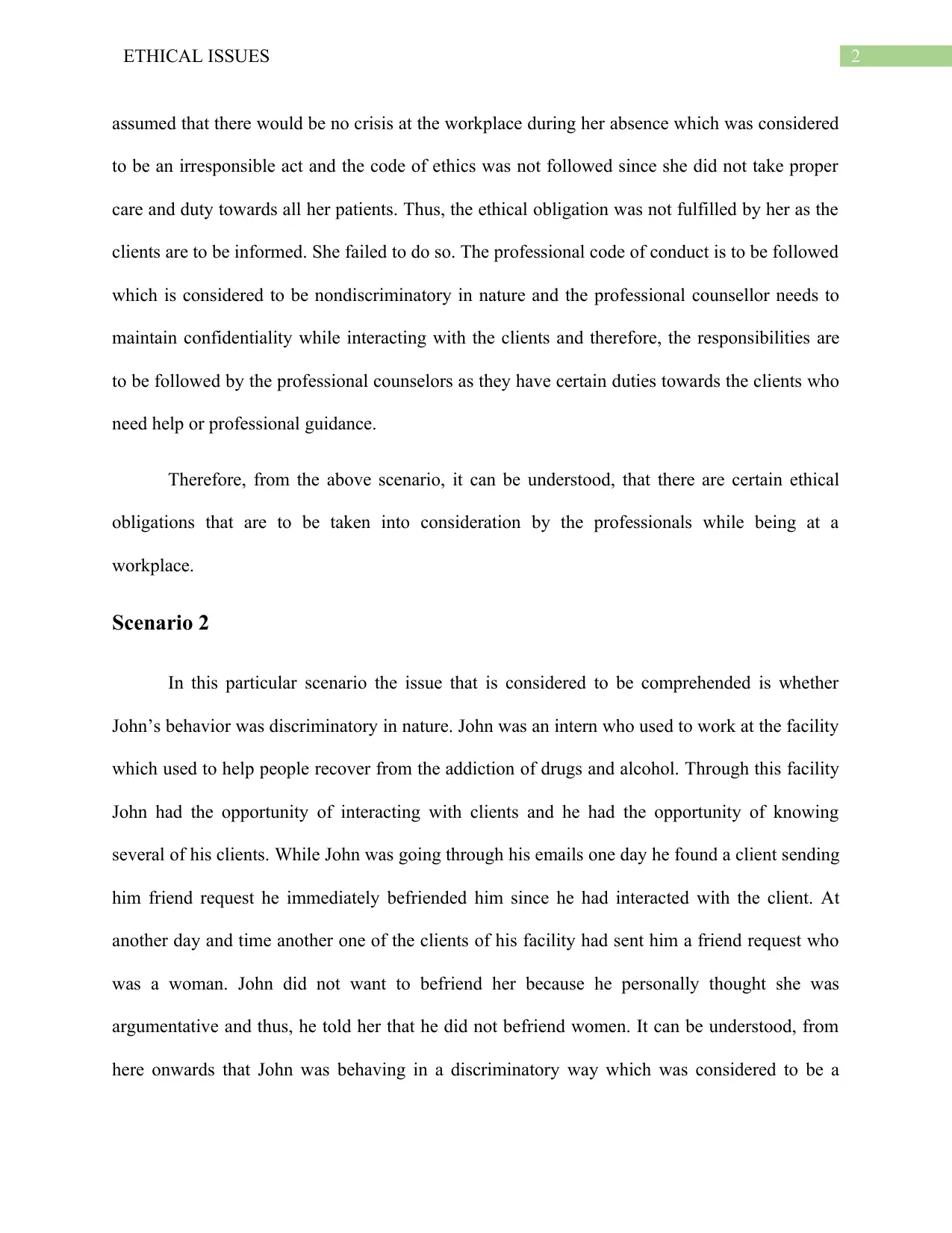
2ETHICAL ISSUES
assumed that there would be no crisis at the workplace during her absence which was considered
to be an irresponsible act and the code of ethics was not followed since she did not take proper
care and duty towards all her patients. Thus, the ethical obligation was not fulfilled by her as the
clients are to be informed. She failed to do so. The professional code of conduct is to be followed
which is considered to be nondiscriminatory in nature and the professional counsellor needs to
maintain confidentiality while interacting with the clients and therefore, the responsibilities are
to be followed by the professional counselors as they have certain duties towards the clients who
need help or professional guidance.
Therefore, from the above scenario, it can be understood, that there are certain ethical
obligations that are to be taken into consideration by the professionals while being at a
workplace.
Scenario 2
In this particular scenario the issue that is considered to be comprehended is whether
John’s behavior was discriminatory in nature. John was an intern who used to work at the facility
which used to help people recover from the addiction of drugs and alcohol. Through this facility
John had the opportunity of interacting with clients and he had the opportunity of knowing
several of his clients. While John was going through his emails one day he found a client sending
him friend request he immediately befriended him since he had interacted with the client. At
another day and time another one of the clients of his facility had sent him a friend request who
was a woman. John did not want to befriend her because he personally thought she was
argumentative and thus, he told her that he did not befriend women. It can be understood, from
here onwards that John was behaving in a discriminatory way which was considered to be a
assumed that there would be no crisis at the workplace during her absence which was considered
to be an irresponsible act and the code of ethics was not followed since she did not take proper
care and duty towards all her patients. Thus, the ethical obligation was not fulfilled by her as the
clients are to be informed. She failed to do so. The professional code of conduct is to be followed
which is considered to be nondiscriminatory in nature and the professional counsellor needs to
maintain confidentiality while interacting with the clients and therefore, the responsibilities are
to be followed by the professional counselors as they have certain duties towards the clients who
need help or professional guidance.
Therefore, from the above scenario, it can be understood, that there are certain ethical
obligations that are to be taken into consideration by the professionals while being at a
workplace.
Scenario 2
In this particular scenario the issue that is considered to be comprehended is whether
John’s behavior was discriminatory in nature. John was an intern who used to work at the facility
which used to help people recover from the addiction of drugs and alcohol. Through this facility
John had the opportunity of interacting with clients and he had the opportunity of knowing
several of his clients. While John was going through his emails one day he found a client sending
him friend request he immediately befriended him since he had interacted with the client. At
another day and time another one of the clients of his facility had sent him a friend request who
was a woman. John did not want to befriend her because he personally thought she was
argumentative and thus, he told her that he did not befriend women. It can be understood, from
here onwards that John was behaving in a discriminatory way which was considered to be a
⊘ This is a preview!⊘
Do you want full access?
Subscribe today to unlock all pages.

Trusted by 1+ million students worldwide
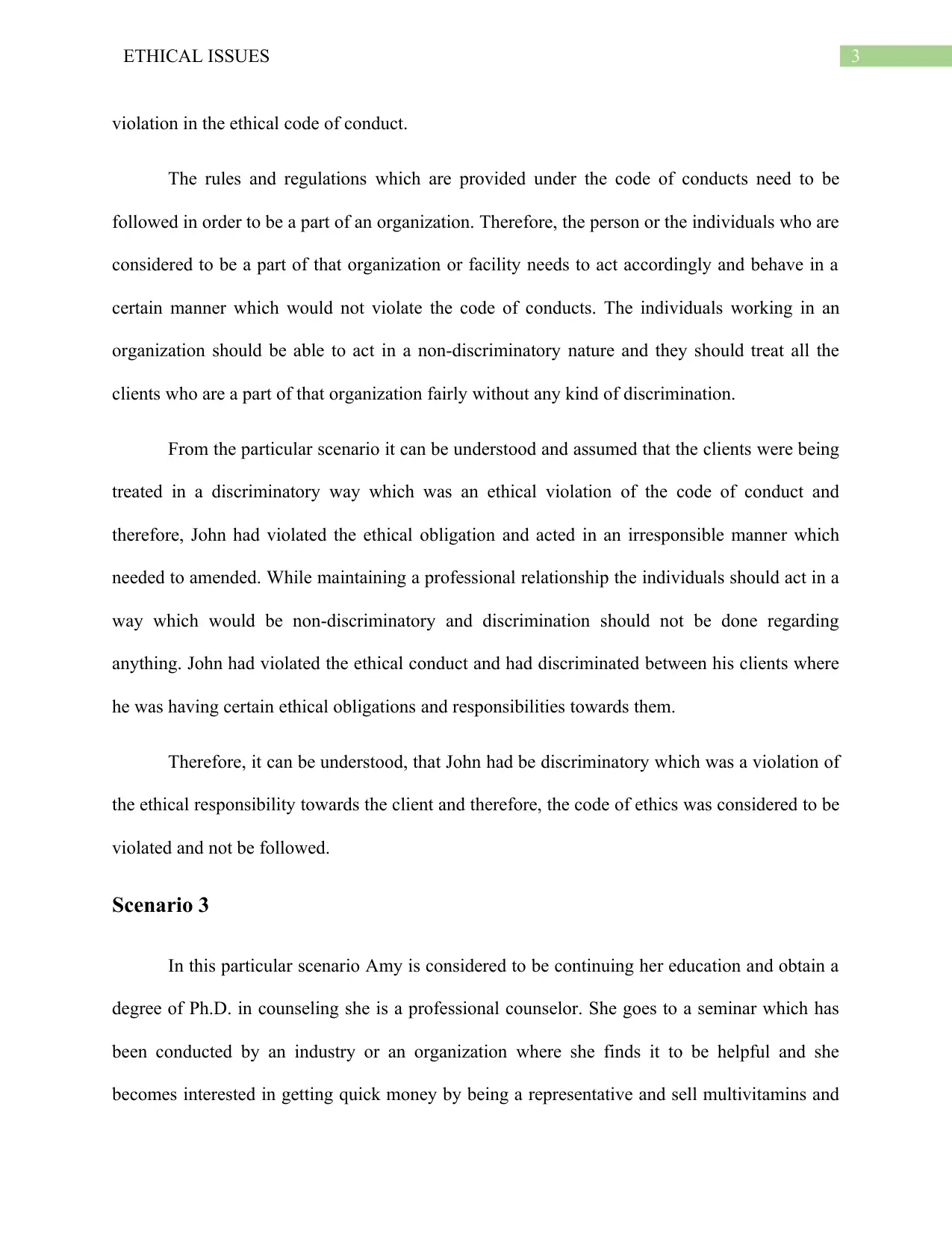
3ETHICAL ISSUES
violation in the ethical code of conduct.
The rules and regulations which are provided under the code of conducts need to be
followed in order to be a part of an organization. Therefore, the person or the individuals who are
considered to be a part of that organization or facility needs to act accordingly and behave in a
certain manner which would not violate the code of conducts. The individuals working in an
organization should be able to act in a non-discriminatory nature and they should treat all the
clients who are a part of that organization fairly without any kind of discrimination.
From the particular scenario it can be understood and assumed that the clients were being
treated in a discriminatory way which was an ethical violation of the code of conduct and
therefore, John had violated the ethical obligation and acted in an irresponsible manner which
needed to amended. While maintaining a professional relationship the individuals should act in a
way which would be non-discriminatory and discrimination should not be done regarding
anything. John had violated the ethical conduct and had discriminated between his clients where
he was having certain ethical obligations and responsibilities towards them.
Therefore, it can be understood, that John had be discriminatory which was a violation of
the ethical responsibility towards the client and therefore, the code of ethics was considered to be
violated and not be followed.
Scenario 3
In this particular scenario Amy is considered to be continuing her education and obtain a
degree of Ph.D. in counseling she is a professional counselor. She goes to a seminar which has
been conducted by an industry or an organization where she finds it to be helpful and she
becomes interested in getting quick money by being a representative and sell multivitamins and
violation in the ethical code of conduct.
The rules and regulations which are provided under the code of conducts need to be
followed in order to be a part of an organization. Therefore, the person or the individuals who are
considered to be a part of that organization or facility needs to act accordingly and behave in a
certain manner which would not violate the code of conducts. The individuals working in an
organization should be able to act in a non-discriminatory nature and they should treat all the
clients who are a part of that organization fairly without any kind of discrimination.
From the particular scenario it can be understood and assumed that the clients were being
treated in a discriminatory way which was an ethical violation of the code of conduct and
therefore, John had violated the ethical obligation and acted in an irresponsible manner which
needed to amended. While maintaining a professional relationship the individuals should act in a
way which would be non-discriminatory and discrimination should not be done regarding
anything. John had violated the ethical conduct and had discriminated between his clients where
he was having certain ethical obligations and responsibilities towards them.
Therefore, it can be understood, that John had be discriminatory which was a violation of
the ethical responsibility towards the client and therefore, the code of ethics was considered to be
violated and not be followed.
Scenario 3
In this particular scenario Amy is considered to be continuing her education and obtain a
degree of Ph.D. in counseling she is a professional counselor. She goes to a seminar which has
been conducted by an industry or an organization where she finds it to be helpful and she
becomes interested in getting quick money by being a representative and sell multivitamins and
Paraphrase This Document
Need a fresh take? Get an instant paraphrase of this document with our AI Paraphraser
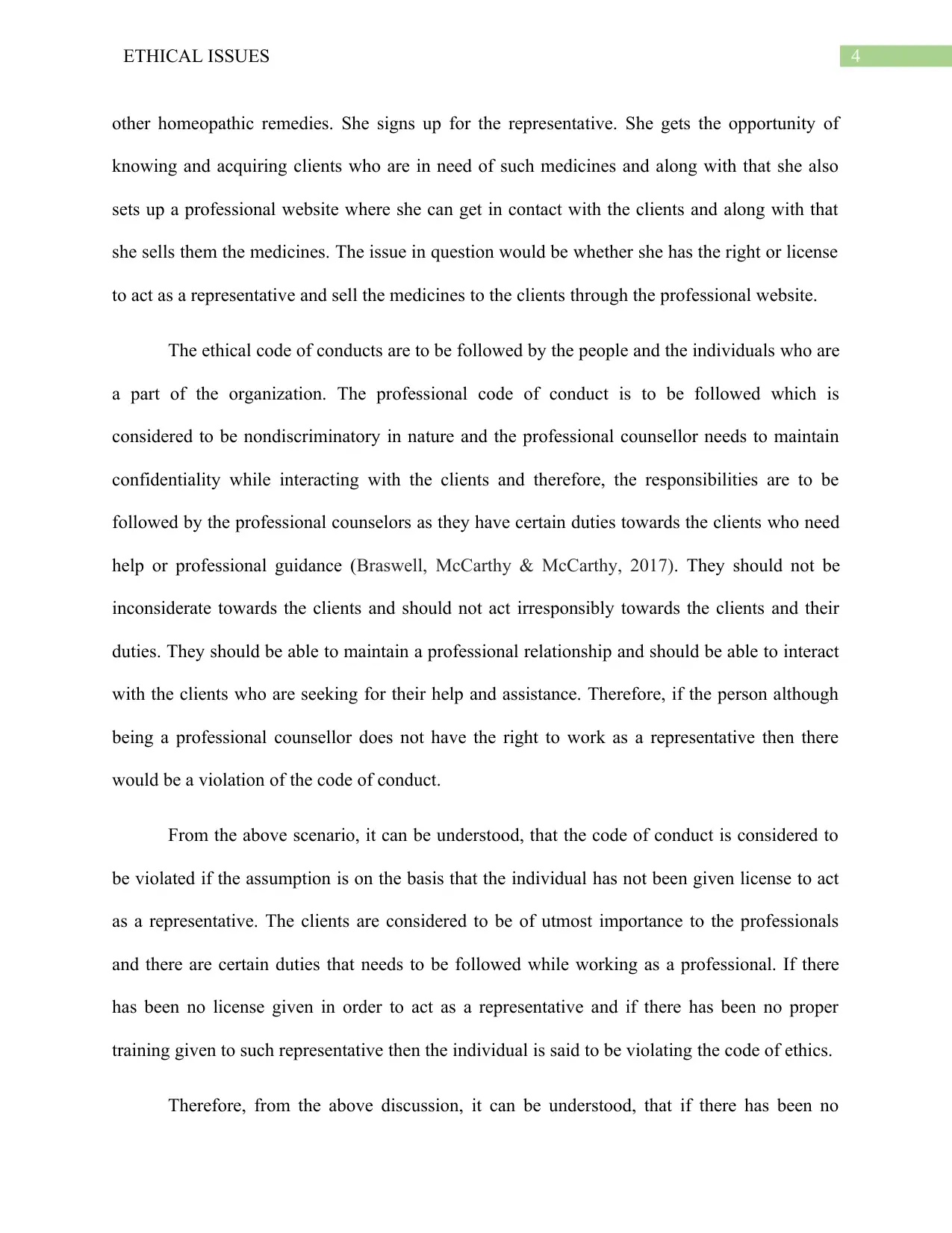
4ETHICAL ISSUES
other homeopathic remedies. She signs up for the representative. She gets the opportunity of
knowing and acquiring clients who are in need of such medicines and along with that she also
sets up a professional website where she can get in contact with the clients and along with that
she sells them the medicines. The issue in question would be whether she has the right or license
to act as a representative and sell the medicines to the clients through the professional website.
The ethical code of conducts are to be followed by the people and the individuals who are
a part of the organization. The professional code of conduct is to be followed which is
considered to be nondiscriminatory in nature and the professional counsellor needs to maintain
confidentiality while interacting with the clients and therefore, the responsibilities are to be
followed by the professional counselors as they have certain duties towards the clients who need
help or professional guidance (Braswell, McCarthy & McCarthy, 2017). They should not be
inconsiderate towards the clients and should not act irresponsibly towards the clients and their
duties. They should be able to maintain a professional relationship and should be able to interact
with the clients who are seeking for their help and assistance. Therefore, if the person although
being a professional counsellor does not have the right to work as a representative then there
would be a violation of the code of conduct.
From the above scenario, it can be understood, that the code of conduct is considered to
be violated if the assumption is on the basis that the individual has not been given license to act
as a representative. The clients are considered to be of utmost importance to the professionals
and there are certain duties that needs to be followed while working as a professional. If there
has been no license given in order to act as a representative and if there has been no proper
training given to such representative then the individual is said to be violating the code of ethics.
Therefore, from the above discussion, it can be understood, that if there has been no
other homeopathic remedies. She signs up for the representative. She gets the opportunity of
knowing and acquiring clients who are in need of such medicines and along with that she also
sets up a professional website where she can get in contact with the clients and along with that
she sells them the medicines. The issue in question would be whether she has the right or license
to act as a representative and sell the medicines to the clients through the professional website.
The ethical code of conducts are to be followed by the people and the individuals who are
a part of the organization. The professional code of conduct is to be followed which is
considered to be nondiscriminatory in nature and the professional counsellor needs to maintain
confidentiality while interacting with the clients and therefore, the responsibilities are to be
followed by the professional counselors as they have certain duties towards the clients who need
help or professional guidance (Braswell, McCarthy & McCarthy, 2017). They should not be
inconsiderate towards the clients and should not act irresponsibly towards the clients and their
duties. They should be able to maintain a professional relationship and should be able to interact
with the clients who are seeking for their help and assistance. Therefore, if the person although
being a professional counsellor does not have the right to work as a representative then there
would be a violation of the code of conduct.
From the above scenario, it can be understood, that the code of conduct is considered to
be violated if the assumption is on the basis that the individual has not been given license to act
as a representative. The clients are considered to be of utmost importance to the professionals
and there are certain duties that needs to be followed while working as a professional. If there
has been no license given in order to act as a representative and if there has been no proper
training given to such representative then the individual is said to be violating the code of ethics.
Therefore, from the above discussion, it can be understood, that if there has been no
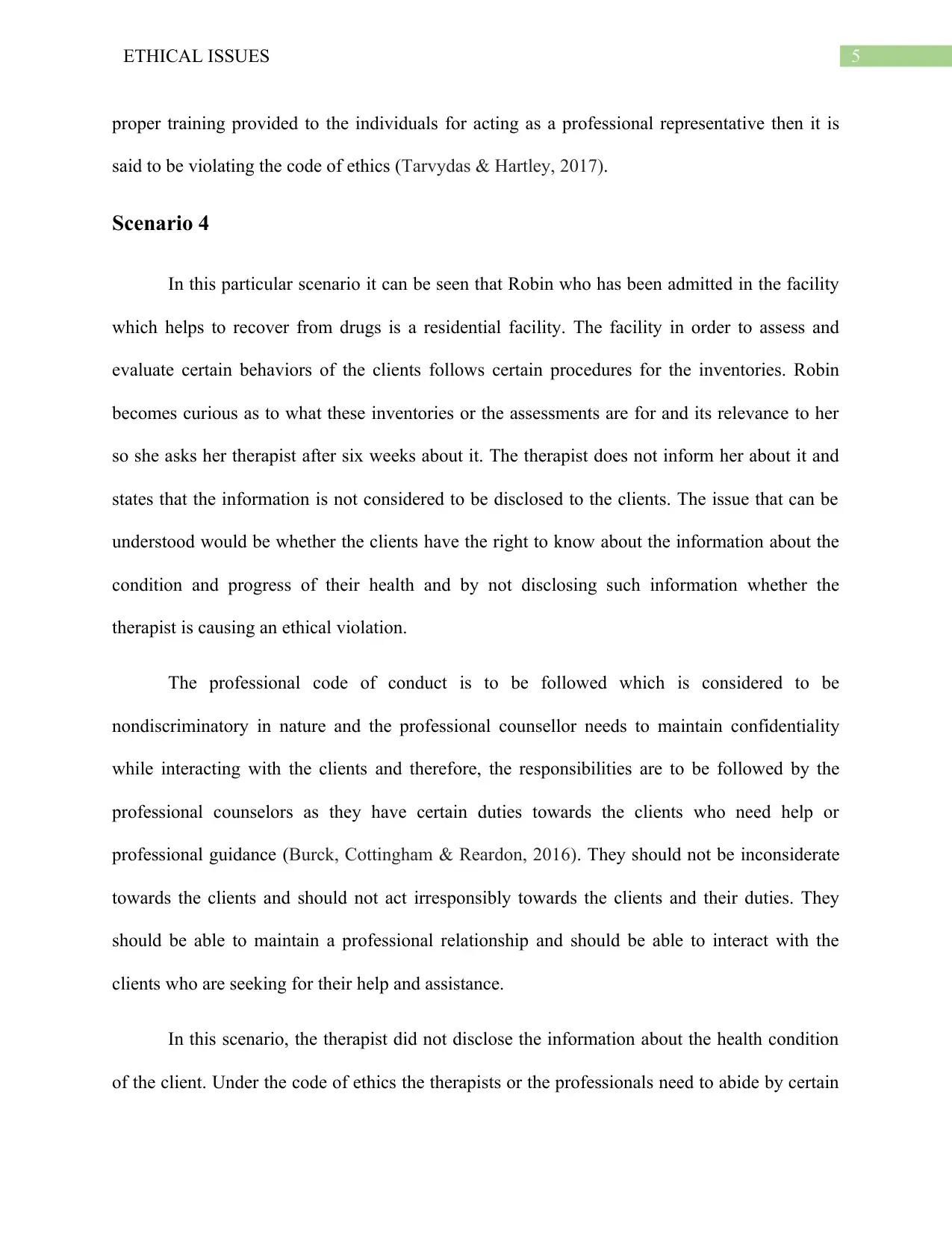
5ETHICAL ISSUES
proper training provided to the individuals for acting as a professional representative then it is
said to be violating the code of ethics (Tarvydas & Hartley, 2017).
Scenario 4
In this particular scenario it can be seen that Robin who has been admitted in the facility
which helps to recover from drugs is a residential facility. The facility in order to assess and
evaluate certain behaviors of the clients follows certain procedures for the inventories. Robin
becomes curious as to what these inventories or the assessments are for and its relevance to her
so she asks her therapist after six weeks about it. The therapist does not inform her about it and
states that the information is not considered to be disclosed to the clients. The issue that can be
understood would be whether the clients have the right to know about the information about the
condition and progress of their health and by not disclosing such information whether the
therapist is causing an ethical violation.
The professional code of conduct is to be followed which is considered to be
nondiscriminatory in nature and the professional counsellor needs to maintain confidentiality
while interacting with the clients and therefore, the responsibilities are to be followed by the
professional counselors as they have certain duties towards the clients who need help or
professional guidance (Burck, Cottingham & Reardon, 2016). They should not be inconsiderate
towards the clients and should not act irresponsibly towards the clients and their duties. They
should be able to maintain a professional relationship and should be able to interact with the
clients who are seeking for their help and assistance.
In this scenario, the therapist did not disclose the information about the health condition
of the client. Under the code of ethics the therapists or the professionals need to abide by certain
proper training provided to the individuals for acting as a professional representative then it is
said to be violating the code of ethics (Tarvydas & Hartley, 2017).
Scenario 4
In this particular scenario it can be seen that Robin who has been admitted in the facility
which helps to recover from drugs is a residential facility. The facility in order to assess and
evaluate certain behaviors of the clients follows certain procedures for the inventories. Robin
becomes curious as to what these inventories or the assessments are for and its relevance to her
so she asks her therapist after six weeks about it. The therapist does not inform her about it and
states that the information is not considered to be disclosed to the clients. The issue that can be
understood would be whether the clients have the right to know about the information about the
condition and progress of their health and by not disclosing such information whether the
therapist is causing an ethical violation.
The professional code of conduct is to be followed which is considered to be
nondiscriminatory in nature and the professional counsellor needs to maintain confidentiality
while interacting with the clients and therefore, the responsibilities are to be followed by the
professional counselors as they have certain duties towards the clients who need help or
professional guidance (Burck, Cottingham & Reardon, 2016). They should not be inconsiderate
towards the clients and should not act irresponsibly towards the clients and their duties. They
should be able to maintain a professional relationship and should be able to interact with the
clients who are seeking for their help and assistance.
In this scenario, the therapist did not disclose the information about the health condition
of the client. Under the code of ethics the therapists or the professionals need to abide by certain
⊘ This is a preview!⊘
Do you want full access?
Subscribe today to unlock all pages.

Trusted by 1+ million students worldwide
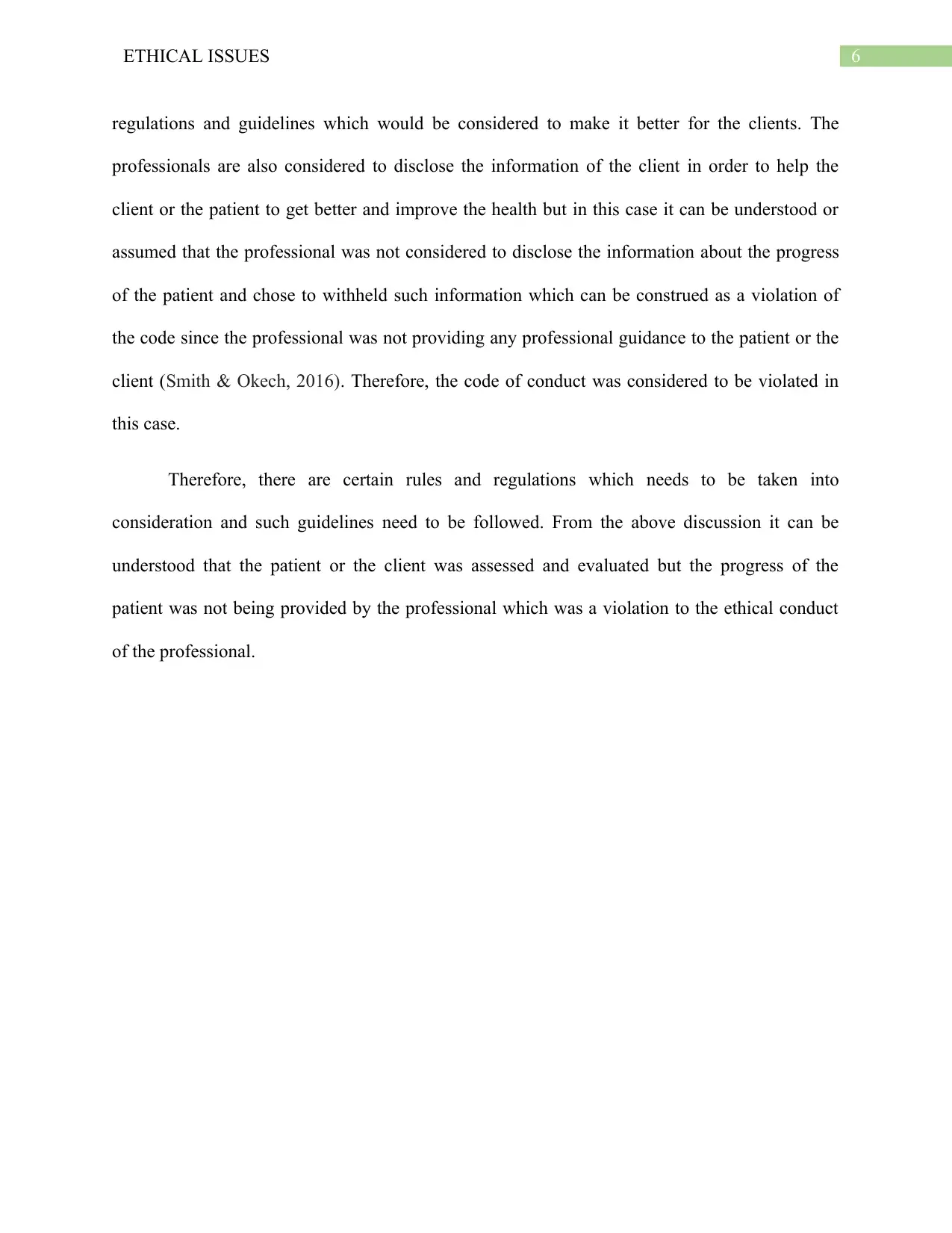
6ETHICAL ISSUES
regulations and guidelines which would be considered to make it better for the clients. The
professionals are also considered to disclose the information of the client in order to help the
client or the patient to get better and improve the health but in this case it can be understood or
assumed that the professional was not considered to disclose the information about the progress
of the patient and chose to withheld such information which can be construed as a violation of
the code since the professional was not providing any professional guidance to the patient or the
client (Smith & Okech, 2016). Therefore, the code of conduct was considered to be violated in
this case.
Therefore, there are certain rules and regulations which needs to be taken into
consideration and such guidelines need to be followed. From the above discussion it can be
understood that the patient or the client was assessed and evaluated but the progress of the
patient was not being provided by the professional which was a violation to the ethical conduct
of the professional.
regulations and guidelines which would be considered to make it better for the clients. The
professionals are also considered to disclose the information of the client in order to help the
client or the patient to get better and improve the health but in this case it can be understood or
assumed that the professional was not considered to disclose the information about the progress
of the patient and chose to withheld such information which can be construed as a violation of
the code since the professional was not providing any professional guidance to the patient or the
client (Smith & Okech, 2016). Therefore, the code of conduct was considered to be violated in
this case.
Therefore, there are certain rules and regulations which needs to be taken into
consideration and such guidelines need to be followed. From the above discussion it can be
understood that the patient or the client was assessed and evaluated but the progress of the
patient was not being provided by the professional which was a violation to the ethical conduct
of the professional.
Paraphrase This Document
Need a fresh take? Get an instant paraphrase of this document with our AI Paraphraser
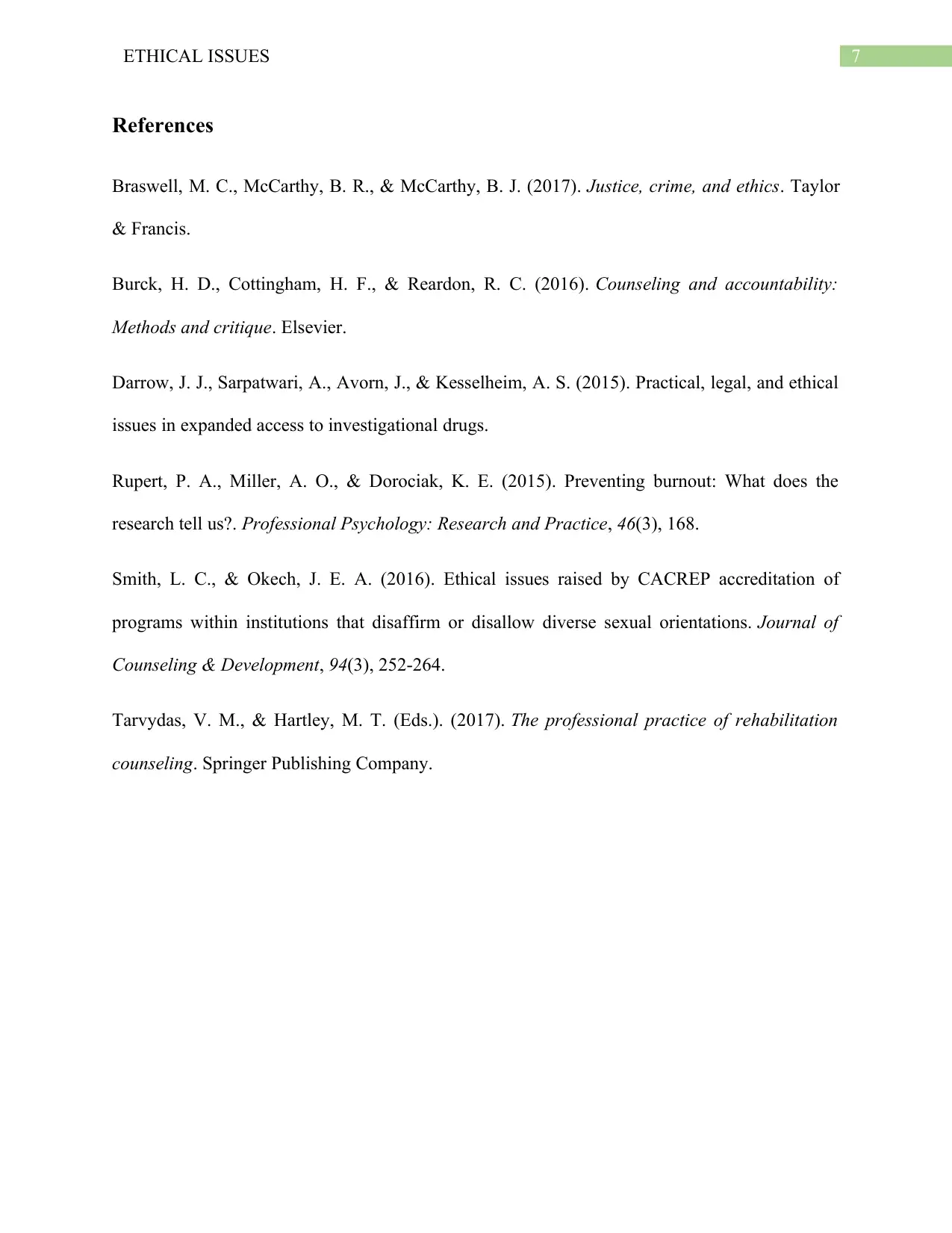
7ETHICAL ISSUES
References
Braswell, M. C., McCarthy, B. R., & McCarthy, B. J. (2017). Justice, crime, and ethics. Taylor
& Francis.
Burck, H. D., Cottingham, H. F., & Reardon, R. C. (2016). Counseling and accountability:
Methods and critique. Elsevier.
Darrow, J. J., Sarpatwari, A., Avorn, J., & Kesselheim, A. S. (2015). Practical, legal, and ethical
issues in expanded access to investigational drugs.
Rupert, P. A., Miller, A. O., & Dorociak, K. E. (2015). Preventing burnout: What does the
research tell us?. Professional Psychology: Research and Practice, 46(3), 168.
Smith, L. C., & Okech, J. E. A. (2016). Ethical issues raised by CACREP accreditation of
programs within institutions that disaffirm or disallow diverse sexual orientations. Journal of
Counseling & Development, 94(3), 252-264.
Tarvydas, V. M., & Hartley, M. T. (Eds.). (2017). The professional practice of rehabilitation
counseling. Springer Publishing Company.
References
Braswell, M. C., McCarthy, B. R., & McCarthy, B. J. (2017). Justice, crime, and ethics. Taylor
& Francis.
Burck, H. D., Cottingham, H. F., & Reardon, R. C. (2016). Counseling and accountability:
Methods and critique. Elsevier.
Darrow, J. J., Sarpatwari, A., Avorn, J., & Kesselheim, A. S. (2015). Practical, legal, and ethical
issues in expanded access to investigational drugs.
Rupert, P. A., Miller, A. O., & Dorociak, K. E. (2015). Preventing burnout: What does the
research tell us?. Professional Psychology: Research and Practice, 46(3), 168.
Smith, L. C., & Okech, J. E. A. (2016). Ethical issues raised by CACREP accreditation of
programs within institutions that disaffirm or disallow diverse sexual orientations. Journal of
Counseling & Development, 94(3), 252-264.
Tarvydas, V. M., & Hartley, M. T. (Eds.). (2017). The professional practice of rehabilitation
counseling. Springer Publishing Company.
1 out of 8
Related Documents
Your All-in-One AI-Powered Toolkit for Academic Success.
+13062052269
info@desklib.com
Available 24*7 on WhatsApp / Email
![[object Object]](/_next/static/media/star-bottom.7253800d.svg)
Unlock your academic potential
Copyright © 2020–2026 A2Z Services. All Rights Reserved. Developed and managed by ZUCOL.





